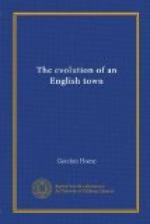Such incidents as these enliven the pages of the Duchy of Lancaster Records, and if there were more space available it would be interesting to give many more of these graphic incidents that took place four hundred years ago. In many places one finds references to the illegal taking of oaks from the forest for building houses. Big boughs or the stems of small trees were placed together in the form of an A with the ends resting on the ground. These beams, that formed the bays of a house, are locally called “forks,” the name by which they are known in the records of the reign of Henry VII. In 1498 we find that “The abbot of Whitby had as many oakes taken in Godlande [Goathland] as made aftre the maner of the Coutrey iij pair of forkes, with other bemes and wall plaites as were mete for the repairalling of an hows of his in Godlande.”
The great legal case between Sir Roger Hastings and the Cholmleys seems to have impoverished the turbulent owner of Roxby, for after the adverse decision Hastings seems to have had difficulty in raising the moneys to meet all the heavy expenses of the trial, and Mr Turton thinks that Roxby was at first mortgaged and afterwards sold to Roger Cholmley, brother of Sir Richard, who had received knighthood in 1509. Sir Richard Cholmley may be considered the founder of the Yorkshire families of Cholmley, and he was in his time a man of great power and influence, holding the four chief offices in the Honor of Pickering, and at the commencement of the reign of Henry VIII. he was appointed Lieutenant of the Tower of London. He had no legal offspring, and his illegitimate son, a Sir Roger, who must not be confused with his uncle, was successively Chief Baron and Lord Chief Justice, died without issue. Sir Hugh Cholmley[1] tells us many facts concerning his great-grandfather Sir Richard, who was a nephew of the former Sir Richard. “His chief place of residence,” he says, “was at Roxby, lying between Pickering and Thornton (now almost demolished), where he lived in great port, having a very great family, at least fifty or sixty men-servants, about his house, and I have been told by some who knew the truth, that when there had been twenty-four pieces of beef put in a morning into the pot, sometimes not one of them would be left for his own dinner: for in those times, the idle-serving men were accustomed to have their breakfast, and with such liberty as they would go into the kitchen, and striking their daggers into the pot, take out the beef without the cook’s leave or privacy; yet he would laugh at this rather than be displeased, saying, ’Would not the knaves leave me one piece for my own dinner?’ He never took a journey to London that he was not attended with less than thirty, sometimes forty men-servants, though he went without his lady. There was a great difference between him and his brother-in-law, the Earl of Westmoreland; and, as I have heard upon this cause: That, after the death of his sister, the Lady Anne, the Earl married the second sister,




